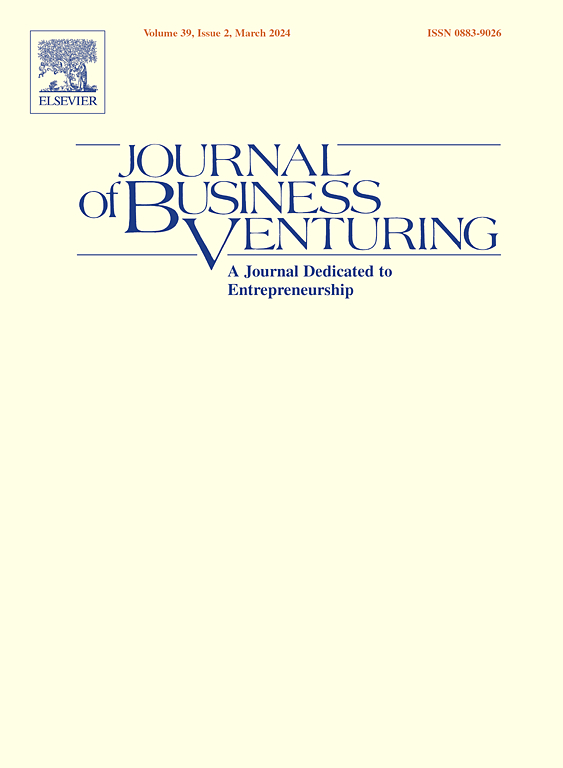The entrepreneurship fountain of youth: Younger management ranks generate more entrepreneurs
IF 8.9
1区 管理学
Q1 BUSINESS
引用次数: 0
Abstract
The present paper argues and tests the proposition that firms with older top and middle managers produce fewer entrepreneurs, because these firms offer less chances to their employees to enter managerial positions that provide valuable experience for entrepreneurship (rank effect theory). Empirical work using linked employer-employee microdata for Portugal support this. The rank effect is stronger in firms with older top managers. Employees who progress slower into managerial ranks are not pushed into entrepreneurship but are more likely to take on jobs as employees in other firms. Overall, our results suggest that firms with younger management ranks offer more chances for workers to enter managerial positions and, therefore, spawn more entrepreneurs.
Executive summary
A common career pathway leading towards entrepreneurship materializes through gaining experience working as a wage employee. In particular, work in top and middle management roles involving leadership and responsibility for strategic decisions should provide experience, knowledge and networks that are valuable for entrepreneurship. Founders of prominent unicorns and start-up ventures throughout the world have acquired significant managerial experience.
Top and middle management roles often involve tasks that demand a broad range of skills associated with obtaining and deploying resources, as well as organizing and managing people. Furthermore, top and middle managerial positions expose individuals to ample opportunities for obtaining new knowledge and learning, including knowledge about new business opportunities.
A recent theory named the rank effect suggests that in societies with older workforces, younger workers are less likely to become entrepreneurs because they are unable to acquire the experience and skills required for entrepreneurship. In aging societies, top and middle managers are more likely to be older and hold on to their positions for longer, thereby blocking younger subordinates from reaching managerial ranks. Since younger people are more likely to possess the energy, creativity, risk-taking and innovative abilities that enable and motivate entrepreneurs, if fewer young employees hold top and middle managerial ranks (so they can acquire essential experience), entrepreneurship rates will likely decline.
Arguably, the rank effect argument overlooks that, if workers are indeed blocked from progressing to managerial positions in firms with older workforces and managers, frustration caused by lack of career advancement may also lead them to leave, either by seeking employment in another firm, or possibly by becoming entrepreneurs themselves. If non-managerial workers frustrated with lack of career progress are more likely to become entrepreneurs, the basic argument of rank theory – that managerial experience is a vital determinant of entrepreneurial ability and motivation – is significantly weakened.
In this article we look at how corporate careers unfold over time towards entrepreneurship, focusing on whether reaching top and middle managerial ranks is indeed a steppingstone towards entrepreneurship. In particular, we seek to find out whether firms with older top and middle managers offer lower chances for workers to reach key managerial ranks and, as a byproduct of those lower chances, are less likely to spawn entrepreneurs. We also examine whether slower than average career progress towards managerial ranks is likely to lead employees to entrepreneurship, or to move jobs to a different firm. Lastly, we test if obtaining top managerial experience may be more strongly linked with likelihood of entrepreneurial transition than obtaining middle managerial experience.
To test our ideas, we use detailed matched employer-employee data for Portugal and focus on wage workers who start a new job spell between 2005 and 2015. We use discrete-time hazard models to investigate whether the age structures of firms' managerial workforces are related with a reduced likelihood for the firm's employees to become entrepreneurs, by lowering their chances to progress in their careers by reaching top and middle managerial roles.
Our main results indicate that top and middle management experience increases the likelihood of workers becoming entrepreneurs, with top management experience leading to the highest likelihood of entrepreneurial transitions. In firms with older managers, workers are less likely to reach key managerial positions and, therefore, less likely to become entrepreneurs. We also find that slower than average advancement towards managerial ranks is likely to lead workers to move to jobs in other firms, but not to entrepreneurship.
Our results suggest that holding top and middle management ranks is an important steppingstone for those individuals whose career path progresses from wage employment to entrepreneurship. A firm's propensity to produce entrepreneurs likely depends not just on its ability to generate new ideas and products but is also related with the age structure of its managerial workforce. Moreover, firms' organizational forms and structures, as they relate to the numbers and functions of top and middle managers, are also likely to influence the spawning of entrepreneurs.
青春创业之泉:管理层年轻化催生更多创业者
本文论证并验证了这样一个命题,即高层和中层管理人员年龄较大的公司产生的企业家较少,因为这些公司为员工提供的进入管理职位的机会较少,而这些职位为创业提供了宝贵的经验(秩效应理论)。在葡萄牙使用关联雇主-雇员微数据的实证研究支持了这一点。在高层管理人员年龄较大的公司中,等级效应更强。晋升较慢的员工不会被迫创业,而是更有可能在其他公司担任员工。总体而言,我们的研究结果表明,拥有年轻管理层的公司为员工提供了更多进入管理职位的机会,因此产生了更多的企业家。作为一名受薪雇员,获得经验是通往创业的一条常见的职业道路。特别是,在涉及领导和负责战略决策的高层和中层管理职位上工作,应提供对创业有价值的经验、知识和网络。世界各地著名独角兽企业和初创企业的创始人都积累了丰富的管理经验。高层和中层管理角色通常涉及需要与获取和部署资源以及组织和管理人员相关的广泛技能的任务。此外,高层和中层管理职位为个人提供了充足的获得新知识和学习的机会,包括有关新商业机会的知识。最近一项名为“等级效应”的理论表明,在劳动力年龄较大的社会中,年轻工人成为企业家的可能性较小,因为他们无法获得创业所需的经验和技能。在老龄化社会中,高层和中层管理人员更有可能是年龄较大的人,并且在他们的职位上停留的时间更长,从而阻碍了年轻的下属晋升到管理职位。由于年轻人更有可能拥有企业家的活力、创造力、冒险精神和创新能力,如果担任高层和中层管理职位的年轻员工减少(这样他们就可以获得必要的经验),创业率可能会下降。可以说,等级效应的观点忽视了这样一个事实:如果员工确实无法在员工和管理人员年龄较大的公司晋升到管理职位,那么由于缺乏职业发展而引起的挫折感也可能导致他们离开,要么去另一家公司找工作,要么自己成为企业家。如果因缺乏职业发展而感到沮丧的非管理人员更有可能成为企业家,那么等级理论的基本论点——管理经验是创业能力和动机的重要决定因素——就会被大大削弱。在这篇文章中,我们来看看企业职业生涯是如何随着时间的推移而走向创业的,重点是进入高层和中层管理职位是否真的是走向创业的垫脚石。特别是,我们想要发现,那些高层和中层管理人员年龄较大的公司,员工晋升到关键管理职位的机会是否较低,作为这些较低机会的副产品,是否更不可能催生企业家。我们还研究了低于平均水平的管理职位的职业发展是否可能导致员工创业,或将工作转移到另一家公司。最后,我们检验了获得高层管理经验是否比获得中层管理经验与创业转型的可能性联系更强。为了验证我们的想法,我们使用了葡萄牙详细的匹配雇主-雇员数据,并将重点放在2005年至2015年间开始新工作的领薪工人身上。我们使用离散时间风险模型来调查公司管理人员的年龄结构是否与公司员工成为企业家的可能性降低有关,因为公司员工达到高层和中层管理职位的机会降低了。我们的主要结果表明,高层和中层管理经验增加了员工成为企业家的可能性,高层管理经验导致创业转型的可能性最高。在经理年龄较大的公司里,员工不太可能达到关键的管理职位,因此也就不太可能成为企业家。我们还发现,低于平均水平的管理层晋升可能会导致员工跳槽到其他公司,而不是创业。我们的研究结果表明,对于那些从工资就业到创业的个人来说,担任中高层管理职位是一个重要的垫脚石。 一家公司培养企业家的倾向可能不仅取决于其产生新想法和新产品的能力,还与其管理人员的年龄结构有关。此外,公司的组织形式和结构,因为它们与高层和中层管理人员的数量和职能有关,也可能影响企业家的产生。
本文章由计算机程序翻译,如有差异,请以英文原文为准。
求助全文
约1分钟内获得全文
求助全文
来源期刊

Journal of Business Venturing
BUSINESS-
CiteScore
16.70
自引率
6.90%
发文量
59
审稿时长
77 days
期刊介绍:
The Journal of Business Venturing: Entrepreneurship, Entrepreneurial Finance, Innovation and Regional Development serves as a scholarly platform for the exchange of valuable insights, theories, narratives, and interpretations related to entrepreneurship and its implications.
With a focus on enriching the understanding of entrepreneurship in its various manifestations, the journal seeks to publish papers that (1) draw from the experiences of entrepreneurs, innovators, and their ecosystem; and (2) tackle issues relevant to scholars, educators, facilitators, and practitioners involved in entrepreneurship.
Embracing diversity in approach, methodology, and disciplinary perspective, the journal encourages contributions that contribute to the advancement of knowledge in entrepreneurship and its associated domains.
 求助内容:
求助内容: 应助结果提醒方式:
应助结果提醒方式:


